You will probably come across a lot of odd questions in your life. In fact, you may be asked these questions or be the one to ask these questions.
While such questions may appear strange from afar, they may actually be valid. Of such questions is – do whales drown?
You might think, “Oh, whales live in water, so it’s obvious that they can’t drown.” But is this true? Let’s see.
Do whales drown? It might be hard to believe, but whales can drown.
Unlike most other marine animals, whales do not breathe underwater. They do not have gills, so they cannot get oxygen from water.
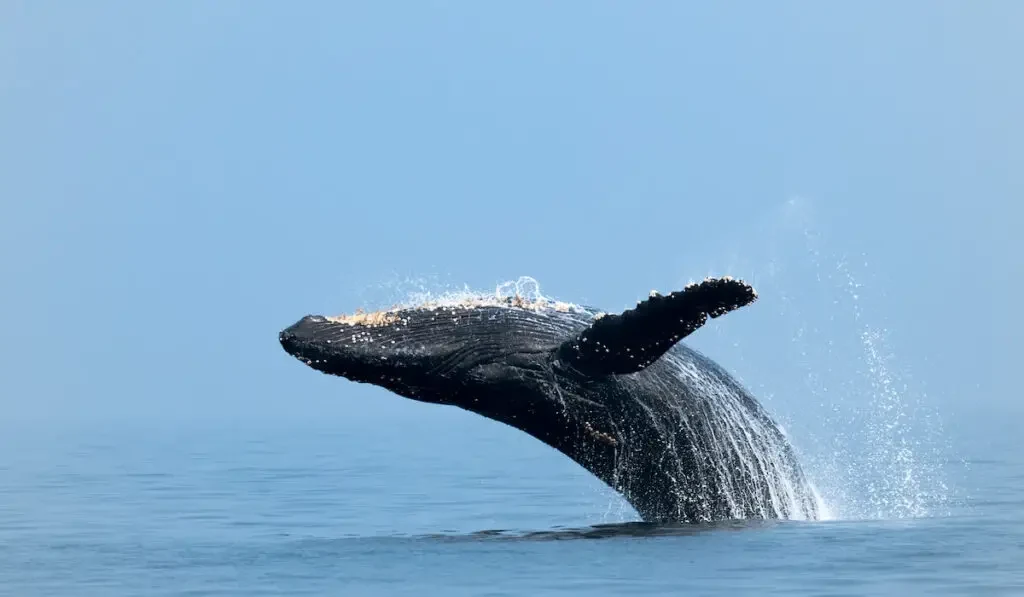
Instead, whales come with lungs, like every other mammal, and they swim up to the surface to fill these lungs with air.
Anytime they dive underwater, they hold their breath like other mammals do, and if they get water in their lungs, they could drown.
The surprise of knowing whales can drown might have you asking further questions. Well, lucky for you, we explore and answer other questions surrounding the respiratory habits of whales.
Table of Contents
Can Whales Drown?
Whales can drown.
But how often they drown is a different question.
Being mammals, whales come with lungs, not gills like most marine animals. With lungs, they can only breathe air, not water.
Since whales live in water, how do they breathe through the air? Well, whales breathe consciously, unlike humans. To breathe, they move to the surface to fill their lungs with air before returning underwater.
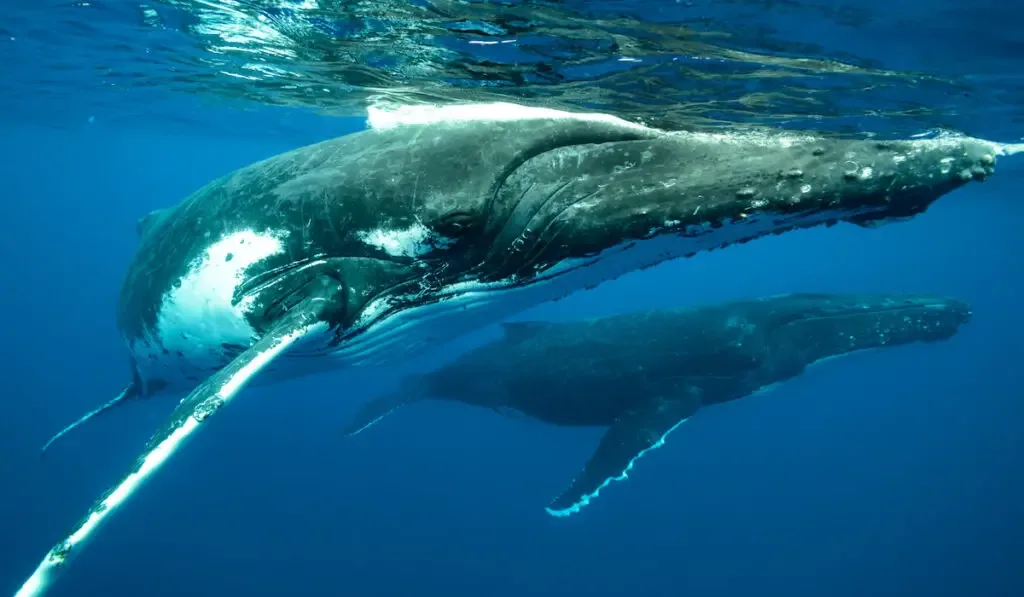
When whales dive underwater, how do they breathe?
As already mentioned, whales breathe consciously—they control their breathing voluntarily. When they dive underwater, they do not breathe, instead, they hold their breath. To do this, they constrict the muscle around their blowhole to keep water out.
The blowhole of a whale is the equivalent of the human nostrils. So, when it is shut, water will not get in their lungs.
All in all, since whales have lungs, not gills, they can drown.
Can They Suffocate?
Let’s answer this question by starting with a definition of what it means to suffocate. In simple terms, to suffocate is to die from lack of air.
Now, since whales can drown, then yes, they can suffocate.
You wonder how? Well, death by drowning is typically caused by suffocation. Water fills the lungs of the whale, thus preventing the entry of oxygen. Without oxygen in their lungs, they ultimately die from a lack of air.
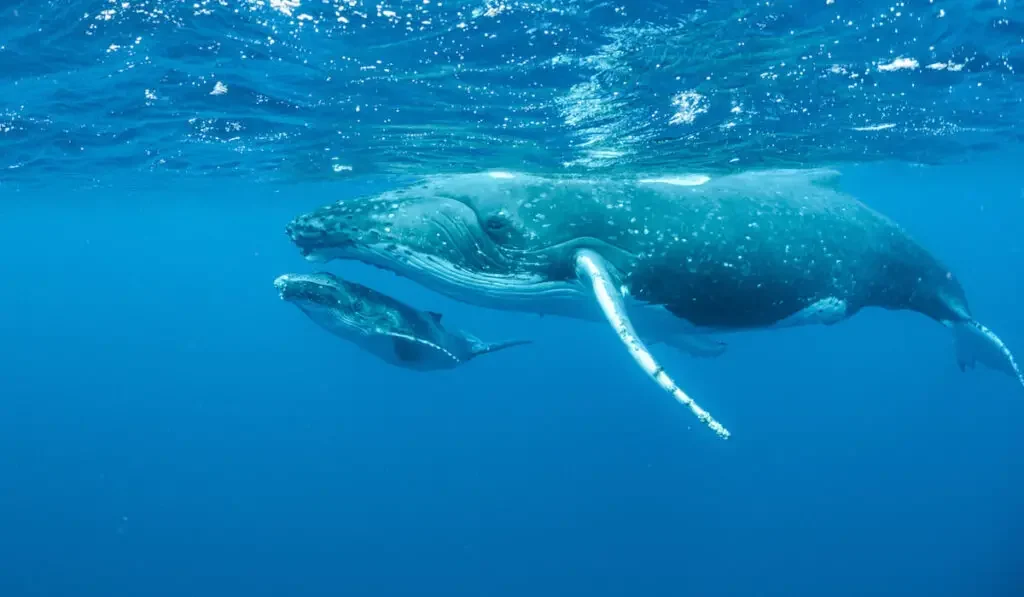
Besides drowning, whales can suffocate when they get stranded.
When whales get beached and are unable to return to water, their weight presses against their ribcage. This restricts their breathing and ultimately causes them to suffocate and die.
Normally, whales are used to floating underwater with their massive weight. But while on land, their body presses against a hard surface and compresses the organs on their ventral side. Hence, the pressure on the ribcage and the restriction in breathing.
How Do Whales Breathe?
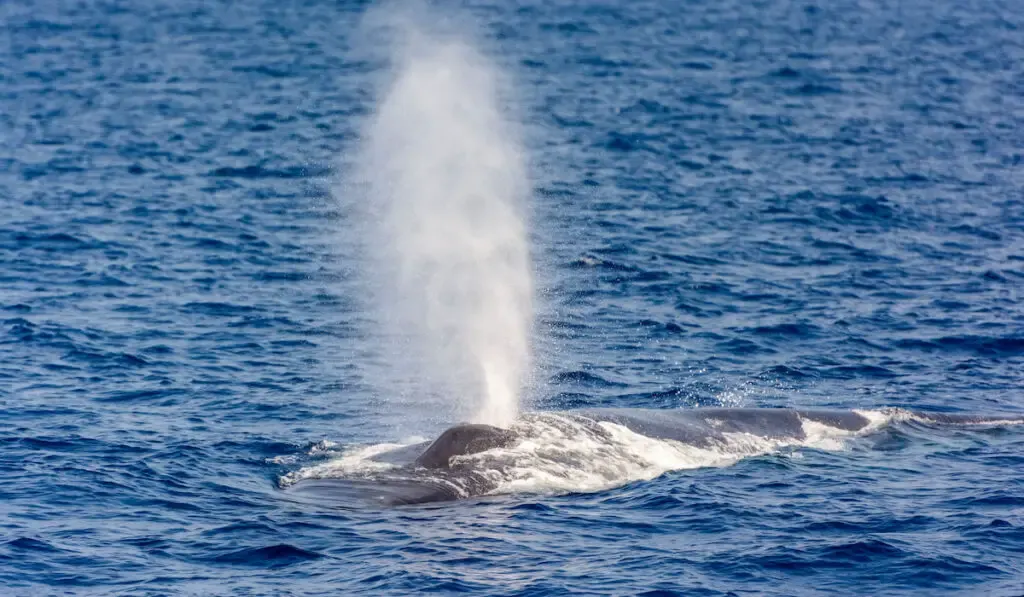
Whales exchange gases in their lungs differently compared to humans.
While humans breathe in and breathe out, whales get all the old air out of their lungs before taking in fresh air.
Their ability to survive underwater with just their lungs is driven by the unique nature of their respiration. For one, their blood can hold more oxygen than ours. This is possible because they have almost twice the proportion of hemoglobin that we have in our blood.
Whales also have a relatively higher myoglobin content in their muscles compared to ours. (Hemoglobin and myoglobin are proteins that hold oxygen in the blood and muscles, respectively).
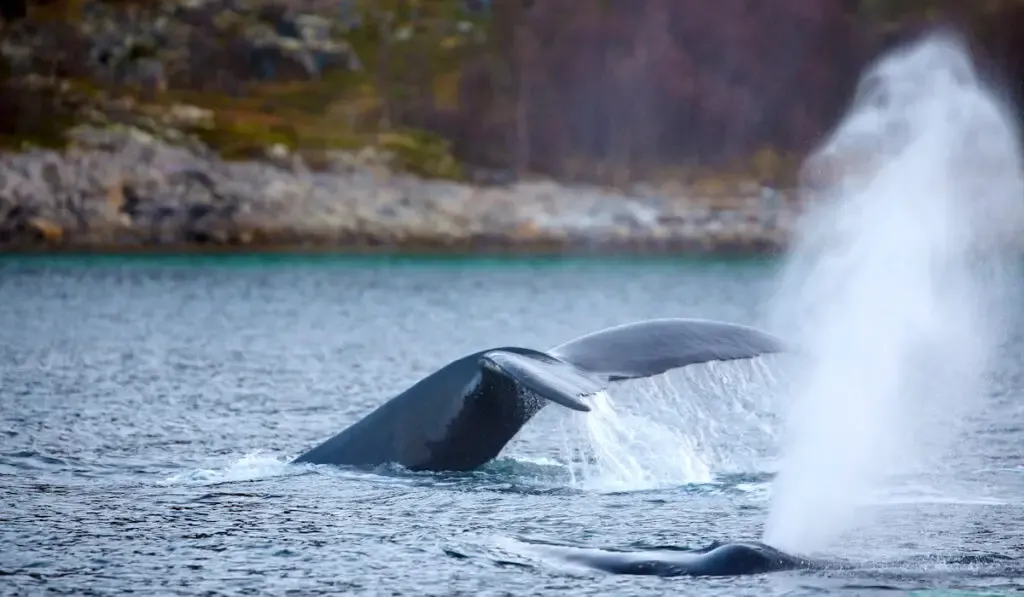
Human blood is about 30% hemoglobin, while whales’ blood is 60% hemoglobin. This disparate hemoglobin and myoglobin content allows whales to store more oxygen in their body than we can.
Whales do not have to store oxygen in their lungs. Instead, they keep around 75% of it in circulation, with up to 35% staying in the myoglobin.
Humans, on the other hand, hold around 35% of their oxygen in the lungs.
When whales breathe, they exchange about 80 to 90% of the air in their lungs. Compared to them, we exchange only around 10 to 15% of the air in our lungs when we breathe.
Besides involving large volumes of air, breathing in whales is also quite fast. This quickness in their gas exchange is matched by the large surface area of their lungs.
In essence, they can take in so much air in a short time because a large area of their lungs comes in contact with oxygen at once.
Unsurprisingly, due to their efficient breathing, whales can hold their breath for 10-60 minutes while underwater. In fact, it is on record that whales have held their breath for 90 minutes to 2 hours.
Going by the information above and considering their size, you might think whales have super large lungs. But this is not totally accurate.
For us humans, our lungs take about 7% of the volume of our body. But for whales, their lungs are about 3% of their body cavity.
Can They Drown Themselves?
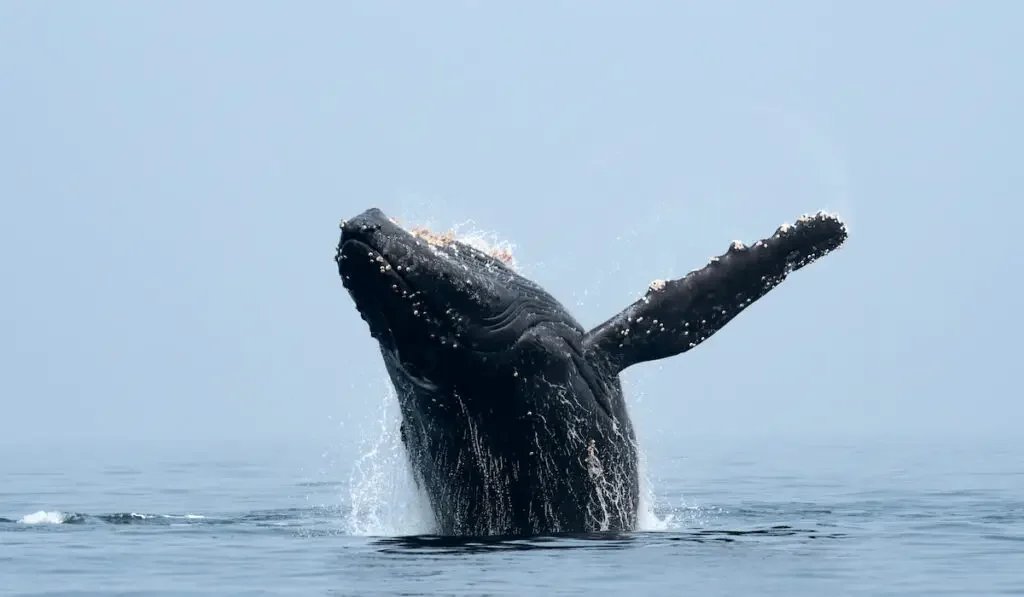
Since whales control their breathing, it is possible for them to try to drown themselves. However, in our research, we found no instances where whales drowned themselves.
Drown in a Storm (How Do They Breathe in a Storm?)
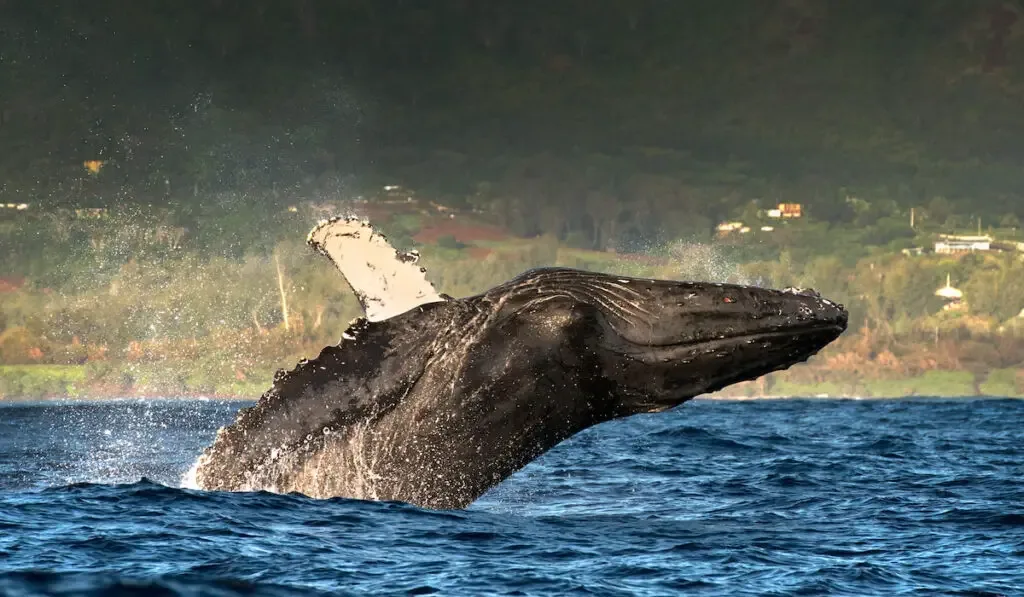
When there is a storm, the water might become turbulent. But no matter how turbulent water gets, whales are able to breathe without taking water into their lungs. So it is uncommon for whales to drown in a storm.
But how do they breathe in a storm?
Well, they breathe the same way they usually do. It appears that things are pretty normal for whales in rough waters. They swim to the surface, expel stale air, and inhale fresh air through their blowhole—all in about a second!
Do They Drown When They Get Old?
When whales get old and die, they typically sink to the bottom of the ocean. Alternatively, they may just get stranded on a coast. But they do not necessarily drown because they are old.
Do Whales Sleep? How Do They Keep From Drowning While Asleep?
Whales sleep but only partially.
Studies have revealed that while sleeping, only one-half of a whale’s brain rests. The two halves of the brain of a whale alternate their periods of rest such that when one sleeps, the other stays alert.
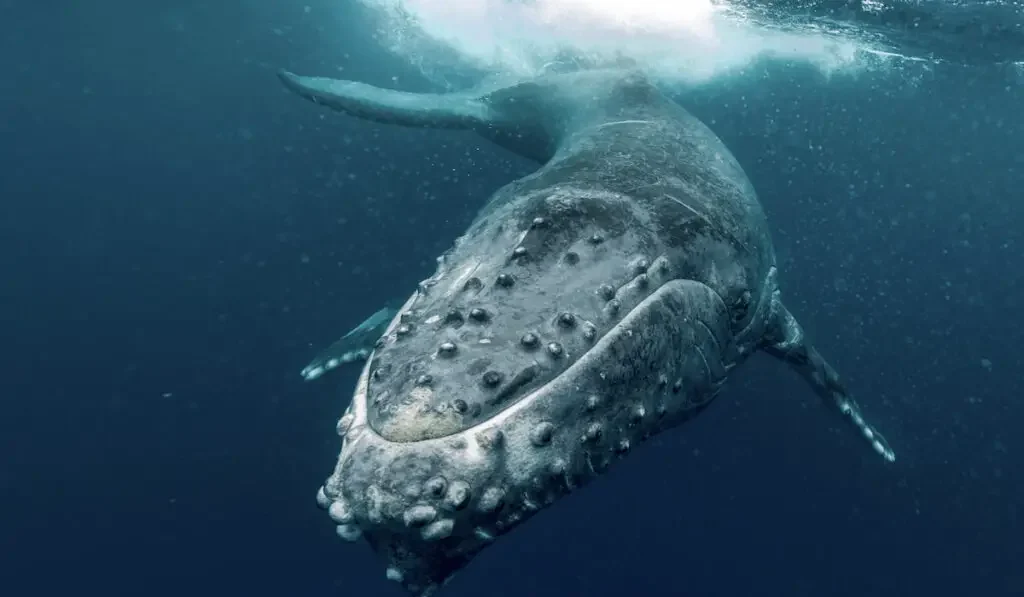
The purpose of sleeping this way is to ensure that the whale does not drown while asleep. Whales use the alert half of their brain to maintain control of their blowhole while they stay partially asleep. This way, they keep themselves from drowning in their sleep.
Besides keeping them from drowning, this method of sleeping in whales helps ensure they are on the lookout for predators, prey, and obstacles around them.
Conclusion
Whales are mammals, and like every other mammal, they have lungs. Since they breathe with lungs and do not have gills, whales can drown. While drowning is possible, it is not common.
Whales have evolved over time to cope underwater with their lungs. They can hold their breath for long periods, they store large volumes of oxygen in their body, and their air intake is rapid.
Resources
- https://www.whalefacts.org/can-whales-drown/
- https://baleinesendirect.org/en/how-can-whales-sleep-in-the-water-without-drowning/
- https://uk.whales.org/whales-dolphins/how-do-whales-and-dolphins-breathe
- https://uk.whales.org/2012/10/20/how-do-whales-breathe/
- https://www.whalesforever.com/whales-lungs.html
- https://www.victoriawhalewatching.com/how-long-can-a-whale-hold-its-breath
- https://baleinesendirect.org/en/les-baleines-dans-la-tempete/
- https://uk.whales.org/2015/01/29/what-do-whales-do-when-a-storm-of-historic-proportion-hits-their-coast/
- https://baleinesendirect.org/en/how-can-a-live-stranded-whale-die-of-asphyxiation/
- https://www.nhm.ac.uk/discover/what-happens-when-whales-die.html
